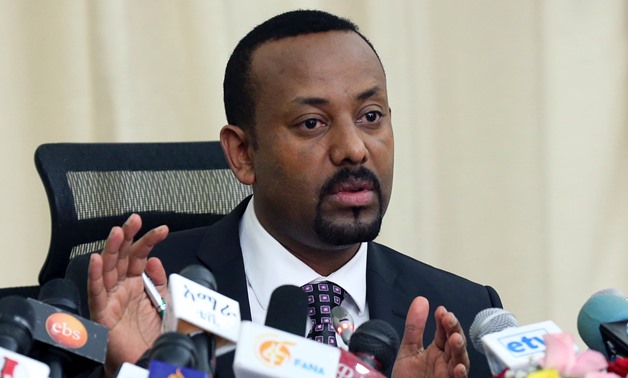
Ethiopia’s Prime Minister, Abiy Ahmed addresses a news conference in his office in Addis Ababa, Ethiopia August 25, 2018. REUTERS/Kumera Gemechu
CAIRO - 26 August 2018: Ethiopian Prime Minister Abiy Ahmed on Saturday blamed the military-based local contractor, Metals and Engineering Corporation (MetEC), for the delay in the construction of a multi-billion dollar Grand Ethiopian Renaissance Dam (GERD), according to the Ethiopian “The Reporter.”
Abiy’s comments came during his meeting with members of the local and international press in his office, the first since he took the office in May, where he noted that he has visited GERD two months ago to follow up the construction process that has been made so far, expressing his disappointment of MetEC performance that is lagging the project far behind.
“Salini is completing its part of the project on time and now it is demanding huge payment because the project is lagging from the side of MetEC,” Abiy told the Media. “We have handed over a complicated water dam project to people who have not seen a dam in their life and if we continue in that direction, the project may never see the light of day,” he added, according to The Reporter.
The 42-year-old Prime Minister tackled several issues in his comments. He said an election due for 2020 would be free and should not be delayed by his sweeping reforms to the African nation's politics, economy and diplomacy.
Abiy has pledged to open up the state-dominated economy and has taken steps to end decades of hostility with neighboring Eritrea -- moves that could reshape the country and the broader Horn of Africa region.
He said on Saturday at his first news conference that the World Bank would provide $1 billion in budget support in the next few months, explaining that "this is due to the reforms taking place in the country."
Since winning office, Abiy has loosened the grip of a state that had ruled with an iron fist. He has ordered the release of political prisoners and decried abuses by security forces as state terrorism.
"My dream and ambition is for democratic elections to be held," the 42-year-old prime minister said.
"Otherwise, what legitimacy can any official have without the mandate earned through elections?"
Abiy said elections, due in 2020, should not be delayed until the reforms he has announced are completed.
He said the ruling Ethiopian People's Revolutionary Democratic Front (EPRDF) coalition's focus next year would be on "preparations for free elections to be held."
Abiy has promised to give more room to opponents in a nation of 100 million where no opposition lawmakers sit in parliament.
He has lifted a state of emergency put in place after his predecessor resigned in February following three years of protests in which hundreds were killed by security forces.
The World Bank and other donors suspended budgetary help following a vote in 2005 that was disputed by the opposition and accompanied by violence that killed 200 people.
The ruling coalition, in power since ousting dictator Mengistu Haile Mariam in 1991, has long been accused by the opposition of crushing dissent, a charge it had denied, though Abiy has spoken frankly since taking office about past abuses.
Some political dissidents have voiced scepticism about change as long as Abiy's EPRDF remains in power.
Protests that led to the resignation of his predecessor were partly driven by Ethiopia's disillusioned youth, suffering high levels of unemployment. Although it has been one of Africa's fastest-growing economies, Ethiopia's export sector - mainly garment manufacturing and farming - has struggled, meaning the economy is not generating enough dollars to pay for imports.
The dollar shortages have been exacerbated by the government's massive investment in infrastructure over the last decade.
The government last month called on Ethiopians to bring their hard currency into banks to ease the shortage, a move which closed the once yawning gap between the official and black market exchange rates for the birr currency.
On Saturday, Abiy said "economic sabotage" had taken place and adding that "large groups" were still hoarding foreign exchange, without giving details.
Though the government has pledged to partially privatize several key state-owned companies, including the telecoms monopoly, the form liberalization will take and the speed with which it will be carried out have not been announced.
Contributed by Reuters


Comments
Leave a Comment